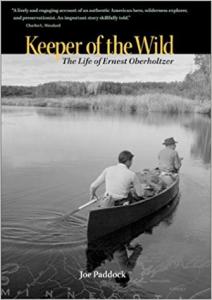by Joe Paddock
Published by the Minnesota Historical Society Press
(2001, 341 pages, $27.95 Hardcover)
Imagine that a doctor gives you only one more year of life. Would you head for the wilderness for one last
trip? Only a few years out of college, that is precisely what Ernest Oberholtzer did in 1909 and his health “improved with every stroke of the paddle”. Taking strength from the wilderness, Ober, as he was known to all, lived on to 1977, when he died at the age of 93. In that summer of 1909, Ober paddled most of the lakes and portages of the Rainy Lake watershed. This includes most if not all of Quetico Provincial Park, the Boundary Waters Canoe Area Wilderness and Voyageurs National Park. But Ober did not just use the wilderness for his personal renewal. To our great benefit, he made it his life’s mission to preserve the Rainy Lake watershed as a public resource to be kept in its original wild state. Before that mission seized Ober’s life, he took a mythical journey through even wilder lakes and rivers of Canada in 1915. With his Ojibwe companion, Billy Magee, he paddled an amazing loop from Manitoba, to remote and unmapped Nueltin Lake in the Northwest Territories, to Hudson Bay and back. The places visited ring with the romance of exploration and are often mentioned in the “dream trips” of today’s paddlers.
This book is a thoughtful and tightly woven narrative of a man’s life. Joe Paddock tells the story in a seamless blend of commentary interspersed with quotes from Ober’s papers and oral history interviews. Ober’s work and spirit are transmitted through his own words. The book follows Ober
from his childhood in Iowa, through his Harvard years, and into his life as a wilderness figure and conservation activist. Late in life, honors came for his long, successful service in the cause of wilderness. His health failed in his last years and Ober died in a nursing home in International Falls.
Ober’s works are not found in books with poetic titles. His major work (and gift to us) was the massive job of managing public and private efforts to keep the northern lakes in their natural state. He was a founder of the Wilderness Society and worked with the Isaak Walton League throughout
the long efforts to protect the lake country. He led the Quetico-Superior Council for twenty years as its first president. Yet this is not a dry story of legislation, lobbying, and legalities. Through narrative and extensive quotes, we see the human drama of the struggles. Millionaire E.W. Backus would
have dammed and developed the entire watershed. Opposed were Ober and his allies, who sought to keep it wild. At times, Ober had to scramble financially while managing one of the most important conservation efforts in our nation’s history.
Ober was complex, talented and adventurous. He was gifted in the making of friends, yet never
married, an accomplished musician, yet made the wilderness his home. As a storyteller, he could
hold listeners spellbound, yet he never published a complete account of his journey through
Nueltin. At his home on The Mallard, a small island in Rainy Lake, he lodged his visitors in a set of
rustic and eccentric buildings; all filled with books. Here, his visitors entertained each other and
were imbued with the magic of the wild north. In terms of friends, Ober was surely one of the
wealthiest men on the planet. The biography contains many heartwarming stories and anecdotes
quoted from these friends and Ober’s correspondence.
Ober held a deep appreciation for the life and culture of the Ojibwe who lived in the Rainy Lake region. Billy Magee and others were often his companions on wilderness trips. Ober collected extensive notes on the language and the stories of the people. He would question the elders for the old legends or myths that were called Atisokan. Eventually, and with respect, the people came to call Ober himself, Atisokan.
There exists a wealth of information about Oberholtzer and his times. Joe Paddock is a poet of
some reputation in our region. He has spent much time at Ober’s Mallard Island home, where the
spirit of Atisokan seeps into one’s bones. Paddock’s narrative is well-researched and written with
great thought, sensitivity and organization. It contains excellent endnotes and a useful index. It contains
the essence of Ober and will be a guide for others who wish to know more of his wilderness
travels or of the great conservation struggles. It illuminates the lives of Ober’s friends and of the
Ojibwe.
Ober’s long wilderness journeys lent strength to all of his endeavors as a promoter and defender of wilderness–as
“Keeper of the Wild”. Read this book. When you next dip a paddle into water pure enough to drink straight up, you will know the man to whom you owe thanks for that splendid experience.
Reviewed by Joe Conrad, former president of the Minnesota Canoe Association, Inc.
This article appeared in Wilderness News Spring 2004

